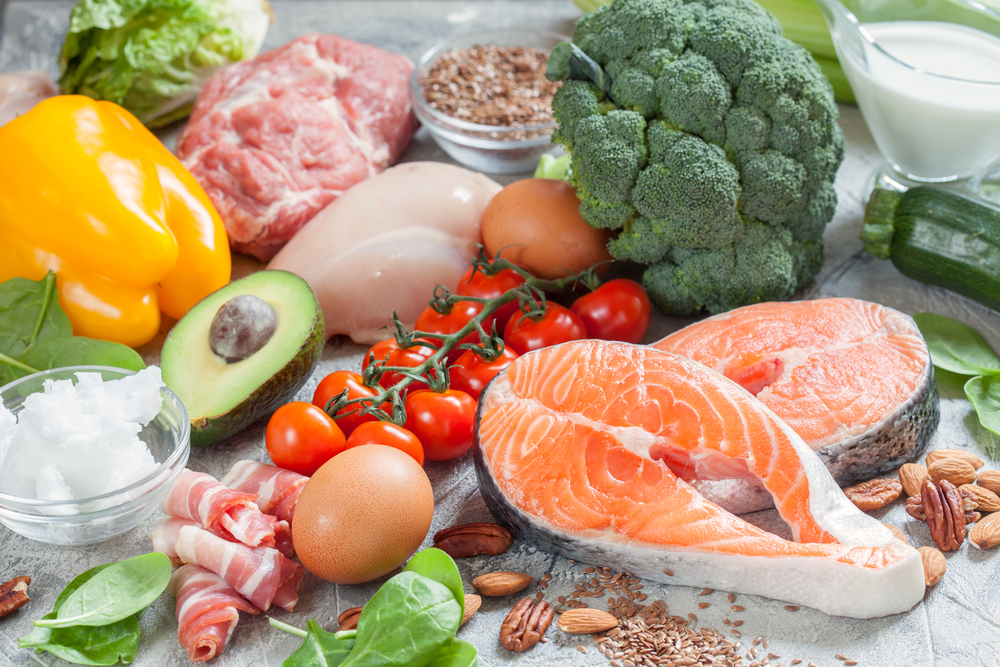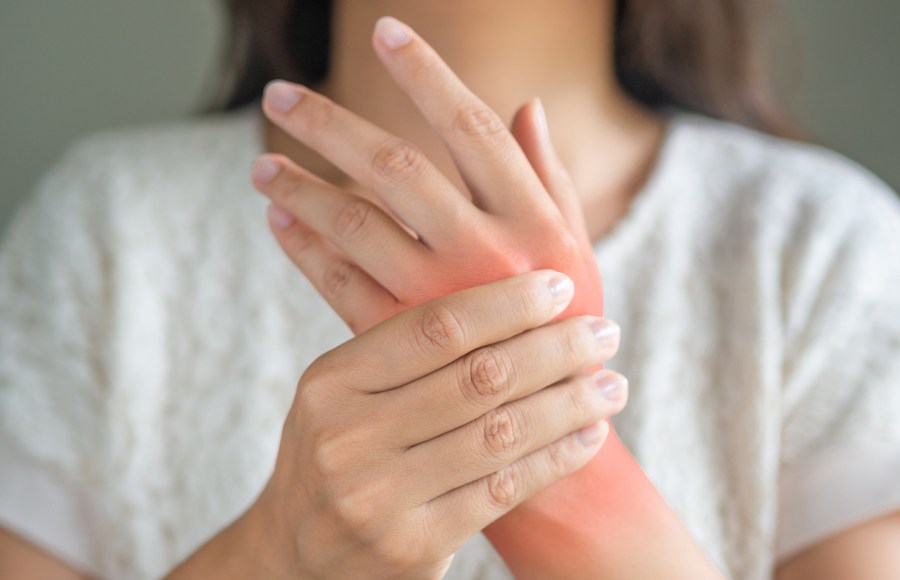A diagnosis of the autoimmune disease rheumatoid arthritis doesn’t mean accepting stiff and painful joints as your future. We look at diet and lifestyle changes to manage and relieve rheumatoid arthritis symptoms…
Being able to move your body freely is something you probably take for granted. But for people with rheumatoid arthritis, simple actions, such as walking, writing a shopping list, typing on a laptop or texting can be extremely painful due to swollen joints.
However, it’s a common misconception rheumatoid arthritis is a disease of old age. In fact, it often first occurs between ages 40 and 60, according to Versus Arthritis. So, about three-quarters of people are of working age when first diagnosed and it’s up to four times more prevalent in women than men.
Approximately 430,000 adults in the UK have RA*, making it one of the most common autoimmune diseases around.
Rheumatoid arthritis: an auto-immune disease
Unlike other forms of arthritis, rheumatoid arthritis is classed as an autoimmune disease, because your immune system mistakenly attacks your own tissue – specifically, the thin lining of cells covering your joints.
This attack thickens and inflames the lining, damaging bones, cartilage, tendons and ligaments. Small joints, such as fingers and toes, are usually first affected, making everyday activities difficult. Later, it can spread to ankles, shoulders, elbows and hips.
Rheumatoid arthritis typically affects both sides of the body symmetrically, especially as the disease progresses. ‘Symptoms are systemic and can include raised temperature and fatigue, as well as pain.
Later stages may include loss of joint function and unlocking of other autoimmune conditions such as Hashimoto’s (immune system-attacking thyroid gland) and Sjogren’s Syndrome (abnormal dryness in eyes and mouth),’ says Daisy Ilchovska, a nutritional therapist at the London Clinic of Nutrition.

What causes rheumatoid arthritis?
It’s important to emphasise rheumatoid arthritis is a disease that affects your whole body, not just your joints. For instance, flu-like symptoms, fatigue and depression are common. So, alleviating the symptoms, naturally, involves bringing your immune system back into balance.
As for a disease trigger, it’s a complex mix of genetics, diet, stress and environmental exposure to heavy metals, bacteria and viruses, according to Ilchovska, who has lived with RA herself for more than 10 years.
‘Gene mutations are responsible for about 25 per cent of predisposing factors, specifically a gene cluster called human leukocyte antigen (HLA). However, having this cluster does not mean you’ll definitely get rheumatoid arthritis. Gene expression generally depends on environmental factors, such as stress, toxic exposure and low vitamin levels, especially low vitamin D,’ she says.
Bacterial infections such as H. pylori, which lives in the digestive tract and can interfere with immune response, may also play a part in causing rheumatoid arthritis. While viral infections such as Epstein-Barr can be a trigger for chronic immune diseases like rheumatoid arthritis, according to scientists.

Rheumatoid arthritis and gut health
‘Preventing intestinal permeability [leaky gut] is the most important factor when managing RA,’ says Ilchovska.
‘About 80 per cent of your immune system lives around the gastrointestinal tract. So, consuming inflammatory substances that destroy the gut wall may lead to immune system over-activation and exacerbation of RA symptoms. This includes overconsumption of gluten-containing foods, such as bread and pasta, excess alcohol and psychological stress.’
Dairy protein, called casein, which is found in milk, cream and cheese, can cause inflammation for some people, worsening rheumatoid arthritis symptoms, according to Ilchovska. Likewise, some people are sensitive to lectins, which are proteins found in legumes and nightshade vegetables, such as tomatoes and aubergines.
What’s the difference between rheumatoid arthritis and osteoarthritis?
Arthritis means ‘inflammation of the joint’. For osteoarthritis, inflammation is caused by wear-and-tear on joints over many years. It typically affects hip or knee joints. The risk of developing it increases with age. Almost half of people aged 75 years and older have symptoms.
In contrast, rheumatoid arthritis is an autoimmune condition, where the immune system attacks healthy joints, and any age group may develop it. (Source: National Rheumatoid Arthritis Society)
Can I manage rheumatoid arthritis symptoms?
If you have rheumatoid arthritis symptoms, it’s important to consult a medical professional as soon as possible because rapid diagnosis can prevent joint damage. The NHS prescribes a mix of medication and lifestyle changes.
First treatment options include disease-modifying antirheumatic drugs (DMARDs) that ease symptoms and slow down the disease. Like most drugs, they come with significant side-effects. Lifestyle changes are an essential part of living well with RA. Below, we’ve got some top tips for how you can achieve optimal health by improving your diet and routine…
7 ways to manage and relieve rheumatoid arthritis
Nutritional therapist Daisy Ilchovska shares how to manage and relieve rheumatoid arthritis symptoms…

1. Try an autoimmune paleo diet
Similar to the paleo diet but designed to reduce symptoms of autoimmune diseases, such as inflammation, fatigue and joint pain, this diet can be beneficial for many with rheumatoid arthritis.
You eliminate foods thought to increase gut permeability (leaky gut), replacing them with gut-friendly foods. Then, you re-introduce some foods to see whether you have sensitivity to a particular one, permanently cutting it out if you do. It’s best to do this under guidance of a nutritional therapist.
2. Keep your gut healthy to relieve rheumatoid arthritis symptoms
Protect against rheumatoid arthritis by eating 6-8 portions a day of varied vegetables, plus good sources of protein (meat, fish, eggs, tofu, quinoa) and healthy fats (olive/coconut oil, fatty fish, nuts).
If you’ve been exposed to gut infections, bacterial overgrowths, or have taken multiple courses of antibiotics, make sure you include probiotic supplements and other gut-healing nutrients, such as the amino acid glutamine (beef or tofu are good food sources or take a supplement).
You should also up your intake of fatty acid butyrate, found in high-fibre food such as beans, fruit, nuts and wholegrains. Avoid excess alcohol and minimise sugar intake to reduce inflammation, too.
3. Optimise your vitamin D
This is needed especially during winter months, due to lack of sunshine. Optimal levels on a blood test are 100-120nmol/l. Experts suggest about 50mcg of vitamin D daily.

4. Avoid environmental toxins to manage rheumatoid arthritis symptoms
Toxins can trigger inflammation and stress your immune system. Some of the things you can do to lessen your toxic load include:
- Filter your drinking water
- Reduce consumption of tuna, which can contain mercury
- Avoid using plastics as food storage containers
- Reduce the use of personal care products containing plastic
- Ensure your home is free of mould as it can trigger or worsen inflammation
- Avoid herbicides and pesticides by eating organic produce
5. Manage stress levels to relieve rheumatoid arthritis symptoms
Stress can make rheumatoid arthritis symptoms worse. Those with post-traumatic stress disorder or childhood trauma are at higher risk of developing rheumatoid arthritis, according to an analysis of 16 scientific studies.
Manage psychological stress with simple self-care routines, such as walks in nature, mindfulness and meditation.
6. Try natural anti-inflammatories
Curcumin and ginger can be effective in suppressing rheumatoid arthritis inflammation. Curcumin is the active substance in the spice turmeric, but it’s not easily absorbed.
Black pepper and fat, such as coconut oil, increases curcumin bioavailability. Or use a good-quality supplement. Also, add fresh ginger to tea and food.

7. Move your body
Gentle exercise is good for people with rheumatoid arthritis. Medical advice has moved on since I was first diagnosed 10 years ago and told not to exercise! Daily exercise helps with stiff joints, fatigue and mood. Try qi gong or tai chi or just gentle stretching exercise.
More help and support for rheumatoid arthritis…







